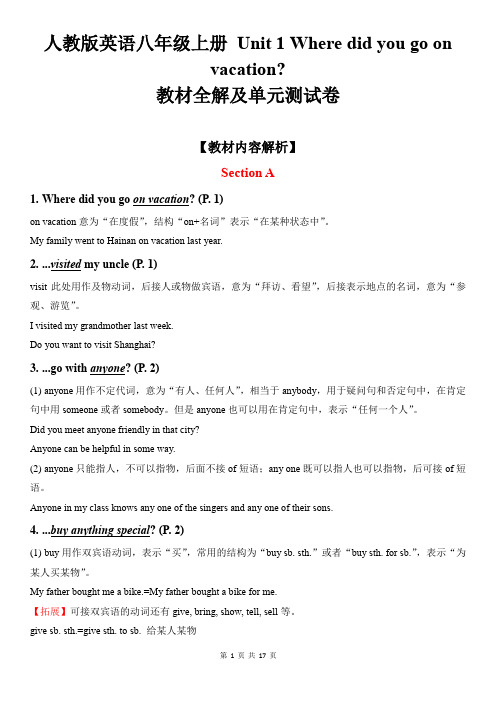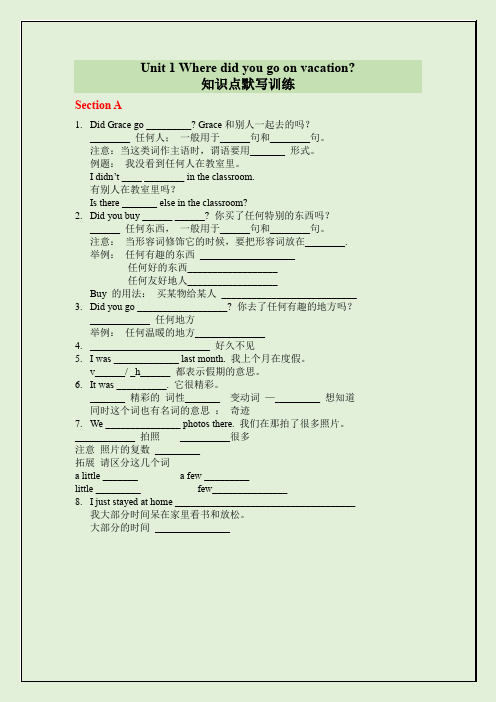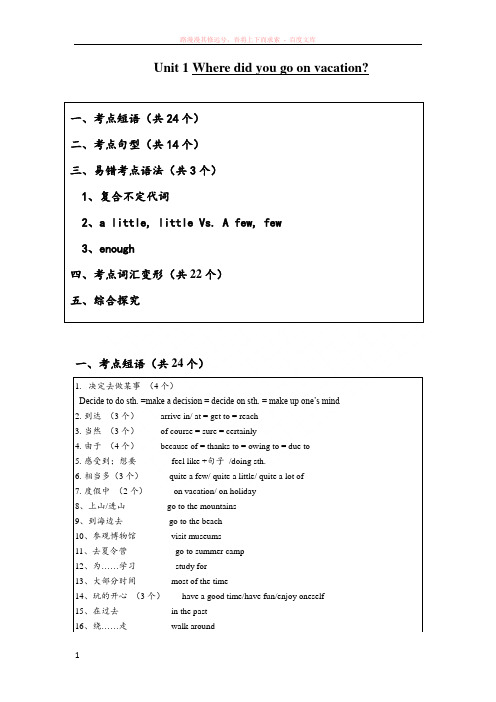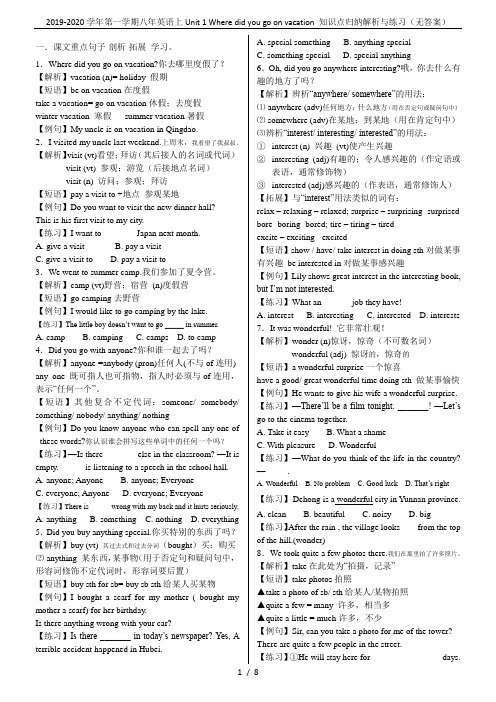八年级上册unit one where did you go on vacation知识点一
【K12教育学习资料】八年级英语上册 Unit 1 Where did you go on vaca

Where did you go on vacation【学习目标】知识目标1. 重点词汇: activity, try, bird, bicycle, building, trader, wonder, difference, top, wait, umbrella, wet, below, enough, hungry, as; arrive in, decide to do sth. feel like, get to, because of2.重点句子: Where did Lisa go on vacation? Did Lisa like her vacation? I felt like I wasa bird. My father didn’t bring enough money…能力目标:能够谈论假期经历并写一篇旅游日记.情感目标:享受生活.【重点难点】能够谈论假期经历并写一篇旅游日记.【知识链接】到达①reach+表示地点的名词②get to+表示地点的名词③arrive in 表示到达大地方, arrive at 表示到达小地方decide to do(动词原形) sth. 决定做某事try to do(动词原形) sth. 尝试做某事feel like 给…的感觉 It feels like rain soon. 好像马上要下雨了。
feel like doing(动词ing) sth. I don't feel like eating bread.我不想吃面包。
enjoy doing(动词ing) sth. 喜欢、享受做某事want to do(动词原形) sth. 想做某事start to do(动词原形) sth./ start doing(动词ing) sth.开始做某事a lot of= lots of=many/much 许多too many +可数名词复数太多… too much+不可数名词复数太多… much too +形容词太…because of 与because 的区别because of+短语 We didn't go out because of the terrible weather. 因为坏天气,because+从句 We didn't go out because the weather was terrible. 我们没有外出。
初中英语人教版八年级上册Unit 1 Where did you go on vac

anyone, anywhere, wonderful, few, quite a few, most, most of time, Huangguoshu Waterfall, Central Park
• Where did you go on vacation? I went to the mountains. • Did you go with anyone? Yes, I did. No, I didn’t. • Did you do anything special last month? • Huangguoshu Waterfall is very wonderful, so I took quite a few photos.
根据汉语完成英语句子。 1. Brad played sports __________ ________ __________ (大多数时间) last weekend. 2. Did you buy ____________ ______________(一些特别的东西) in India? 3. Li Ming took ____________ __________ ___________ (相当多) photos in Guizhou. 4. Hi, Helen. ________ _______ ________ __________. (好久不见了). 5. Did Julie go out _____________ _____________(和任何人一起)? 6. Did you go _____________ ______________(任何有趣的地方)? 7. Grace went to ____________ ____________ (中央公园) in NewYork City. 8. I was __________ __________ (在度假) last month.
初中英语人教版八年级上册Unit 1 Where did you go on vac

复合不定代词
1.定义: 由some, any, no, every加上-one, -body, -thing
构成复合代词。我们称之为复合不定代词。
2.常见的复合不定代词
somebody 某人 someone 某人 something 某物,某事 nobody 没有人 no one 没有人 nothing 没有东西 anybody 任何人 anyone 任何人 anything 任何事物 everybody 每人 everyone 每人 everything 每一件事情;一切
3.用法:
(1) 相当于名词,可作主语、宾语和表语,不做定语;作 主语时谓语要用单数形式。 例如: I have nothing to say today? 今天我没有什么可讲的。(作宾语) Nothing is difficult if you put your heart into it.
世上无难事,只怕有心人。(作主语)
结构二:谓语是行为动词 肯定句:主语﹢动词的过去式….
否定句:主语﹢didn’t ﹢动词原形.
疑问句: Did ﹢主语﹢动词原形?
用法:描述过去一段时间内经常或习惯性的动作;常与频率副词
连用。
例句:I always walked to school in the past. 过去我总是步行上学。
We often play together when we were children. 我们小时候常在一起玩。
Where did they go on vacation?
They went to summer camp.
Where did they go on vacation?
They went to the museum.
人教版英语八年级上册_Unit_1_Where_did_you_go_on_vacation教材全解

人教版英语八年级上册Unit 1 Where did you go onvacation?教材全解及单元测试卷【教材内容解析】Section A1.Where did you go on vacation? (P. 1)on vacation意为“在度假”,结构“on+名词”表示“在某种状态中”。
My family went to Hainan on vacation last year.2....visited my uncle (P. 1)visit此处用作及物动词,后接人或物做宾语,意为“拜访、看望”,后接表示地点的名词,意为“参观、游览”。
I visited my grandmother last week.Do you want to visit Shanghai?3....go with anyone? (P. 2)(1)anyone用作不定代词,意为“有人、任何人”,相当于anybody,用于疑问句和否定句中,在肯定句中用someone或者somebody。
但是anyone也可以用在肯定句中,表示“任何一个人”。
Did you meet anyone friendly in that city?Anyone can be helpful in some way.(2)anyone只能指人,不可以指物,后面不接of短语;any one既可以指人也可以指物,后可接of短语。
Anyone in my class knows any one of the singers and any one of their sons.4....buy anything special? (P. 2)(1)buy用作双宾语动词,表示“买”,常用的结构为“buy sb. sth.”或者“buy sth. for sb.”,表示“为某人买某物”。
My father bought me a bike.=My father bought a bike for me.【拓展】可接双宾语的动词还有give, bring, show, tell, sell等。
八年级英语上册 Unit 1 Where did you go on vacation

Where did you go on vacation一、教学目标:知识与技能:1.能够掌握课标要求的“四会”词汇:anyone,anywhere anyone, anywhere2.能掌握以下句型:① —Where did you go on vacation? —I went to the mountains.② —Where did Tina to on vacation? —She went to the beach.③ —Did you go with anyone? —Yes, I did./No, I didn’t.。
3.了解如何使用一般过去时。
过程与方法:1、谈论过去的活动,学习一般过去时。
2、通过表格总结动词的过去式规则及不规则变化。
3、通过对话的形式了解学生的假期生活。
情感态度价值观:学会用一般过去时进行信息交流,培养学生的环保意识,热爱大自然。
二、教学重点与难点:1、一般过去时态的用法。
2、一般过去式的不规则变化。
三、教学准备:1、多媒体课件板书设计Unit 1 Where did you go on vacation?SectionA(1a-2d)1.Words:anyone,anywhere2.Sentences:① —Where did you go on vacation? —I went to the mountains.② —Where did Tina to on vacation? —She went to the beach.③ —Did you go with anyone? —Yes, I did./No, I didn’t.3.Past tense:stay---- stayed go ----went visit----visited do---did study---studied buy----bought swim---swam play--played。
人教版八年级英语上册 Unit 1 Where did you go on vacation_

Unit 1 Where did you go on vacation?知识点默写训练Section A1.Did Grace go _________? Grace和别人一起去的吗?________ 任何人;一般用于______句和________句。
注意:当这类词作主语时,谓语要用_______ 形式。
例题:我没看到任何人在教室里。
I didn’t ____ ________ in the classroom.有别人在教室里吗?Is there _______ else in the classroom?2.Did you buy ______ ______? 你买了任何特别的东西吗?______ 任何东西,一般用于______句和________句。
注意:当形容词修饰它的时候,要把形容词放在________.举例:任何有趣的东西___________________任何好的东西__________________任何友好地人__________________Buy 的用法:买某物给某人___________________________ 3.Did you go __________________? 你去了任何有趣的地方吗?____________ 任何地方举例:任何温暖的地方______________4.________________________ 好久不见5.I was _____________ last month. 我上个月在度假。
v______/ _h______ 都表示假期的意思。
6.It was __________. 它很精彩。
_______ 精彩的词性_______ 变动词—_________ 想知道同时这个词也有名词的意思:奇迹7.We _______________ photos there. 我们在那拍了很多照片。
____________ 拍照__________很多注意照片的复数_________拓展请区分这几个词a little _______ a few _________little _________few_______________8.I just stayed at home ____________________________________我大部分时间呆在家里看书和放松。
八年级英语上册Unit1Wheredidyougoonvacation教材详解(新版)人教新目标版

Unit 1 Where did you go on vacation?第一单元主重点:①复习一般过去时②复合不定代词的用法③反身代词的用法④系动词的用法⑤动词后的to do和doing的差异⑥e d 形容词和 ing 形容词的差异⑦“近义词”的差异⑧本单元中的主谓一致现象⑨动词过去式的组成及不规则动词表⑩用同义短语变换同义句时谓语动词形式一致性的培育。
⑾叹息句的构造和连词的选择。
一、词组、短语:1、 go on vacation 去度假2、 stay at home 呆在家,3、 go to the mountains 上山/进山4、 go to the beach 到海边去5、 visit museums 观光博物馆,6、 go to summer camp 去夏令营7、 quite a few 相当多,8、 study for 为学习,9、 go out 出去,10、 most of the time 大多半时间 / 绝大多时间,11、 taste good 尝起来滋味好,12、 have a good time 玩的高兴,13、 of course 自然能够,14、 feel like 感觉像 / 想要 ,15、 go shopping 购物,16、 in the past 在过去,17、 walk around 绕走,18、 too many 太多(可数名词前方),19、 because of 因为,20、 one bowl of 一碗 ,21、 find out 查出来/发现,22、 go on 连续,23、 take photos 照相,24、 something important 重要的事情,25、 up and down 上上下下,26、 come up 出来二、重要句子(语法):Where did you go on vacation? 你到哪里去度假了?I went to New York City. 我去了纽约城Did you go out with anyone? 你出去带人吗?No, No one was here. Everyone was on vacation. 不,没有人在这儿。
八年级上册unit1wheredidyougoonvacation知识点及习题

Unit 1 Where did you go on vacation?一、考点短语(共24个)二、考点句型(共14个)三、易错考点语法(共3个)1、复合不定代词2、a little, little Vs. A few, few3、enough四、考点词汇变形(共22个)五、综合探究一、考点短语(共24个)1.决定去做某事(4个)Decide to do sth. =make a decision = decide on sth. = make up one’s mind2.到达(3个)arrive in/ at = get to = reach3.当然(3个)of course = sure = certainly4.由于(4个)because of = thanks to = owing to = due to5.感受到;想要feel like +句子/doing sth.6.相当多(3个)quite a few/ quite a little/ quite a lot of7.度假中(2个)on vacation/ on holiday8、上山/进山go to the mountains9、到海边去go to the beach10、参观博物馆visit museums11、去夏令营go to summer camp12、为……学习study for13、大部分时间most of the time14、玩的开心(3个)have a good time/have fun/enjoy oneself15、在过去in the past16、绕……走walk around17、另外两个小时another two hours18、一碗……one bowl of19、查出来/发现find out20、继续go on/keep on21、照相take photos22、重要的事情something important23、上上下下up and down24、出来;升起come up二、考点句型(共14个)1. buy sth. for ab./ buy sb. Sth. 为某人买某物2. taste + adj. 尝起来……3. nothing ….but + V.(原形) 除了……之外什么都没有4. seem + (to be) + adj 看起来5. forget to do sth. 忘记去做某事 / forget doing sth 忘记做过某事6. so + adj + that + 从句如此……以至于……7. try doing sth. 尝试做某事 / try to do sth. 尽力做某事8. enjoy doing sth. 喜欢做某事9. want to do sth. 想去做某事10. start doing sth. 开始做某事11. stop doing sth. 停止做某事/ stop to do sth. 停下来去做另一件事12.tell sb. (not) to do sth. 告诉某人(不要)做某事13. dislike/hate doing sth. 不喜欢做某事14. Why not do sth. 为什么不做…….呢?三、考点语法(共10个)考点1、复合不定代词原文重现:P2 Did you go anywhere interesting?考察方式:单选、阅读理解、短文填空、完成对话、书面表达一、含义:由两部分组成的不明确对象的代词。
人教版英语八上Unit 1 Where did you go on vacation讲义

Unit1 Where did you go on vacation?一、重点词汇及拓展1. anyone pron.任何人anyone interesting 任何有趣的人e.g. Did you meet anyone interesting? 你有遇到任何有趣的人吗?2. anywhere adv. 在任何地方e.g. An accident can happen anywhere. 任何地方都可能发生事故。
3. wonderful adj.精彩的,绝妙的wonder n. 奇迹v. 好奇wonderfully adv. 精彩地e.g. The food was just wonderful. 食物非常好吃。
4. few adj. & pron. 不多,很少(否定含义)little 不多,很少(修饰不可数名词)quite a few 不少fewer较少的fewest 最少的e.g. It only took a few seconds. 那只需要几秒钟。
5. quite a few 相当多,不少e.g. Quite a few people know that. 有不少人知道。
6. most adj.& adv. & pron.最多,大多数e.g. Most people live in the city. 大多数人生活在城市。
7. something pron. 某事,某物something useful 有用的东西something else 其他事物e.g. I have something in my eyes. 我眼睛里进东西了。
8. nothing pron. 没什么nothing to do 无所事事nothing much 很少nothing but 只有e.g. Money means nothing to him. 钱对于他毫无价值。
9. everyone pron. 每个人,有人e.g. Everyone has a chance to win. 每个人都有获胜的机会。
人教版八年级上册各单元知识点大归纳之Unit 1 Where did you go on vacat

八年级上册英语各单元知识点大归纳Unit1Where did you go on vacation?一、语法通关(一)、不定代词:不指名代替任何特定名词或形容词的代词叫做不定代词。
常见的不定代词有all , both ,each , some ; any ; many ; much ; few ; little ; one ; ones ; someone ; anyone ; something ; anything ; nothing...本单元我们主要区别some和any以及由它们组成的复合不定代词。
1、some和any+可数名/不可数名.some多用于肯定句,any多用于否定句、疑问句和条件从句。
当问话者希望得到对方肯定回答的时候,疑问句中也可以用some,不用any。
例如:Hello , I’m a reporter. Can I ask you some questions?你好,我是一名记者,我可以问你一些问题吗?2、由some ; any ; no ; every构成的复合不定代词作主语时,其谓语动词用第三人称单数。
例如:No one wants to be fat.没有人想要长胖。
3、不定代词若有定语修饰,该定语要置于其后,例如:something interesting。
又如:There is nothing interesting in today’s film. 今天的电影没有什么有趣之处。
(二)、关于一般过去时。
肯定句:主语+was \ were +其它,例如:It was great.主语+动词过去式+其它,例如:We went to the beach yesterday. 我们昨天去了沙滩。
否定句:主语+was \ were + no t+其它,例如:It was not great. (was not = wasn’t)主语+didn’t动词原形+其它,例如:We didn’t go to the beach yesterday. 我们昨天没去沙滩。
2019-2020学年第一学期八年英语上Unit 1 Where did you go on vac

一.课文重点句子·剖析·拓展学习。
1.Where did you go on vacation?你去哪里度假了?【解析】vacation (n)= holiday 假期【短语】be on vacation在度假take a vacation= go on vacation休假;去度假winter vacation 寒假summer vacation暑假【例句】My uncle is on vacation in Qingdao.2.I visited my uncle last weekend.上周末,我看望了我叔叔。
【解析】visit (vt)看望;拜访(其后接人的名词或代词)visit (vt) 参观;游览(后接地点名词)visit (n) 访问;参观;拜访【短语】pay a visit to +地点参观某地【例句】Do you want to visit the new dinner hall?This is his first visit to my city.【练习】I want to _______ Japan next month.A. give a visitB. pay a visitC. give a visit toD. pay a visit to3.We went to summer camp.我们参加了夏令营。
【解析】camp (vt)野营;宿营(n)度假营【短语】go camping去野营【例句】I would like to go camping by the lake.【练习】The little boy doesn’t want to go _____ in su mmer.A. campB. campingC. campsD. to camp 4.Did you go with anyone?你和谁一起去了吗?【解析】anyone =anybody (pron)任何人(不与of连用) any one 既可指人也可指物,指人时必须与of连用,表示“任何一个”。
- 1、下载文档前请自行甄别文档内容的完整性,平台不提供额外的编辑、内容补充、找答案等附加服务。
- 2、"仅部分预览"的文档,不可在线预览部分如存在完整性等问题,可反馈申请退款(可完整预览的文档不适用该条件!)。
- 3、如文档侵犯您的权益,请联系客服反馈,我们会尽快为您处理(人工客服工作时间:9:00-18:30)。
知识点一介词on的用法
On:表示“进行中,在从事……中”,引出后面的活动(尤其是旅行)
例句:学校旅行
On a school trip
知识点二be on vacation/ go on vacation
Go on vacation: 去度假,强调动作
Be on vacation : 在度假,强调状态
例句:我打算下个月去度假。
I plan to go on vacation next month.
例句:鲍勃和他全家在度假。
Bob and his family are on vacation.
拓展:
Marry sb. = get married with sb. :表示动作
Be married to sb. :表示状态
例句:你愿意嫁给我吗?
Would you marry me?
例句:她嫁给了一位有钱人。
She was married to a businessman.
知识点三vacation/ holiday/ festival/ day
国庆节 National Day 教师节 Teacher’s Day
儿童节 Children’s Day 妇女节 Women’s Day
例句:
春节 Spring Festival 端午节 Dragon Boat Festival
中秋节 Mid-Autumn Festival 元宵节 Lantern Festival
例句:我们学校有一个艺术节。
There is an art festival in our school.
The long summer vacation is over.
度假
Have/ take/ spend a holiday
Go on holiday s/vacation
例句:我在乡下度假。
I spent my holiday in the countryside.
知识点三visit vt. & n.
1.Visit是及物动词,后面可以直接跟宾语。
Visit sb.:拜访
Visit sw.: 参观
参观颐和园:visit the Summer Palace
2.Visit还可以作名词,“拜访,参观”,可以构成短语:
Pay a visit to……= be on a visit to……
例句:我昨天拜访了老师。
I paid a visit to my teacher yesterday.
例句:我们正在拜访英语老师。
We are on a visit to English teacher now.
知识点四go to the mountains
Go to the mountain s去爬山 go to work 去上班 Movie s去看电影school 去上学 Beach 去海滩 bed 上床睡觉 Doctor 去看医生town 去镇上 Church 去教堂
Go to结构中,有的名词需要加the,有的没有,这需要记下。
例句:杰克上周和朋友去爬山了。
Jack went to the mountains with his friends last week.
知识点五重要句型
—Where did you Tina go on vacation?
—She went to the mountains
知识点六anyone
知识点七study for test
为了考试而学习
例句:他们出去散步了。
They went out for a walk.
知识点八long time no see. 很久不见。
知识点九 anywhere
Anywhere adv. “在任何地方”,常用于一般疑问句或否定句中,代替somewhere
例句:我到处也找不到我的钥匙。
I can’t find my keys anywhere.
例句:他们去过什么有趣的地方吗?
Did they go anywhere interesting?
知识点十 wonderful
Adj. 精彩的;绝妙的;令人高兴的;令人愉快的
例句:我们昨晚过得很愉快。
We have a wonderful time last night.
美好的假期
Wonderful holiday
知识点十一 quite a few
A few girls are playing volleyball.
例句:在那片森林里有很多鸟。
There are quite a few birds in the forest.
例句:她买了很多东西。
She bought quite a few things.
We took a few photos there.
例句:我们在那几乎没有拍照片。
We took few photos there.
例句:这篇文章中有几个生词。
There are a few new words in the text.
例句:那时很少有人喜欢坐火车。
Few people liked taking trains at that time.
例句:瓶子里几乎没有糖了。
There is little sugar in the bottle.
例句:别着急,还有一点时间。
Don’t worry. There is still a little time.
练习:In our school, _____ students like English, but ______ of them can speak English smoothly.
答案: a few; few
知识点十二most
1.Adj. 大多数的
例句:大多数人都这样想。
Most people think so.
2.Prone. “大多数,大部分”,通常用于“most of”结构中。
Most of + the + 复数名词例句:most of the students
+ 形容性物主代词+ 名词例句:most of her book
+ 宾格代词例句: most of us
例句:大部分的学生喜欢读这个故事。
Most of the students like reading the story.
例句:他们中的绝大部分我都认识。
I know most of them.
例句:他的很多书都很畅销。
Most of his book sells well.
3.Adv. 修饰形容词最高级
强调:most of 结构作主语时,谓语动词取决于of后面的名词或代词。
例句:这本书的大部分还是很有趣的。
Most of the book is interesting.。
